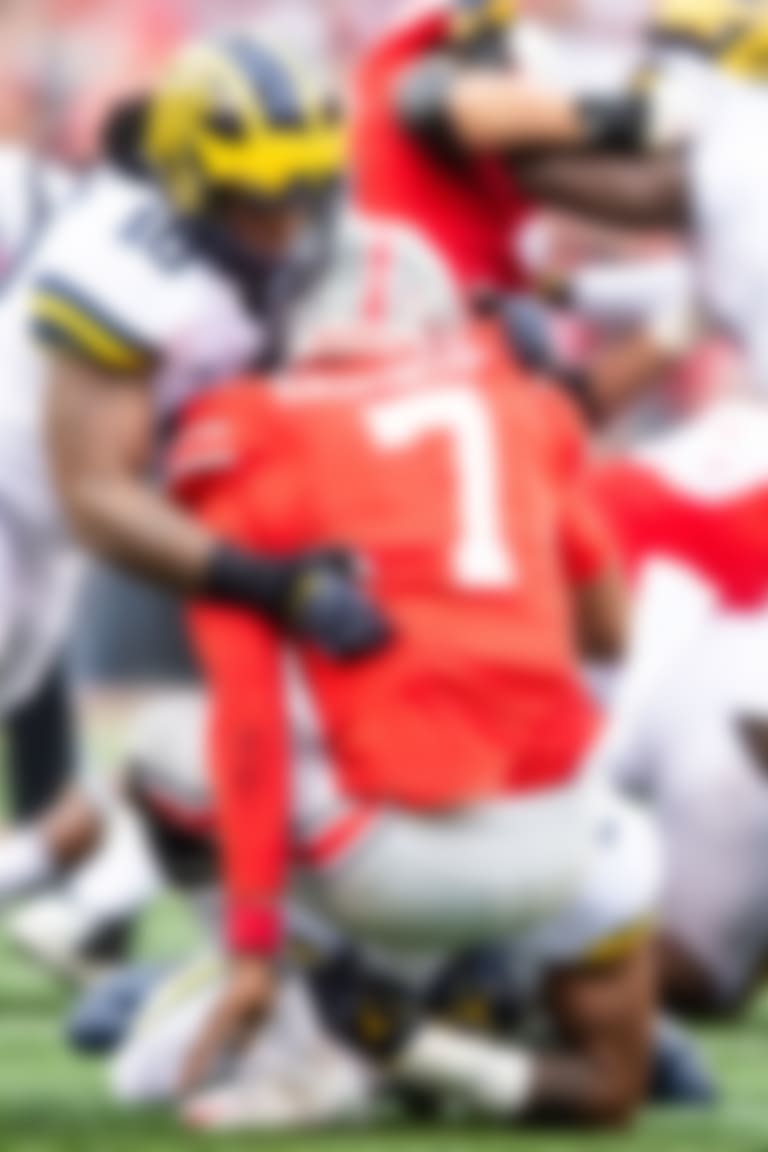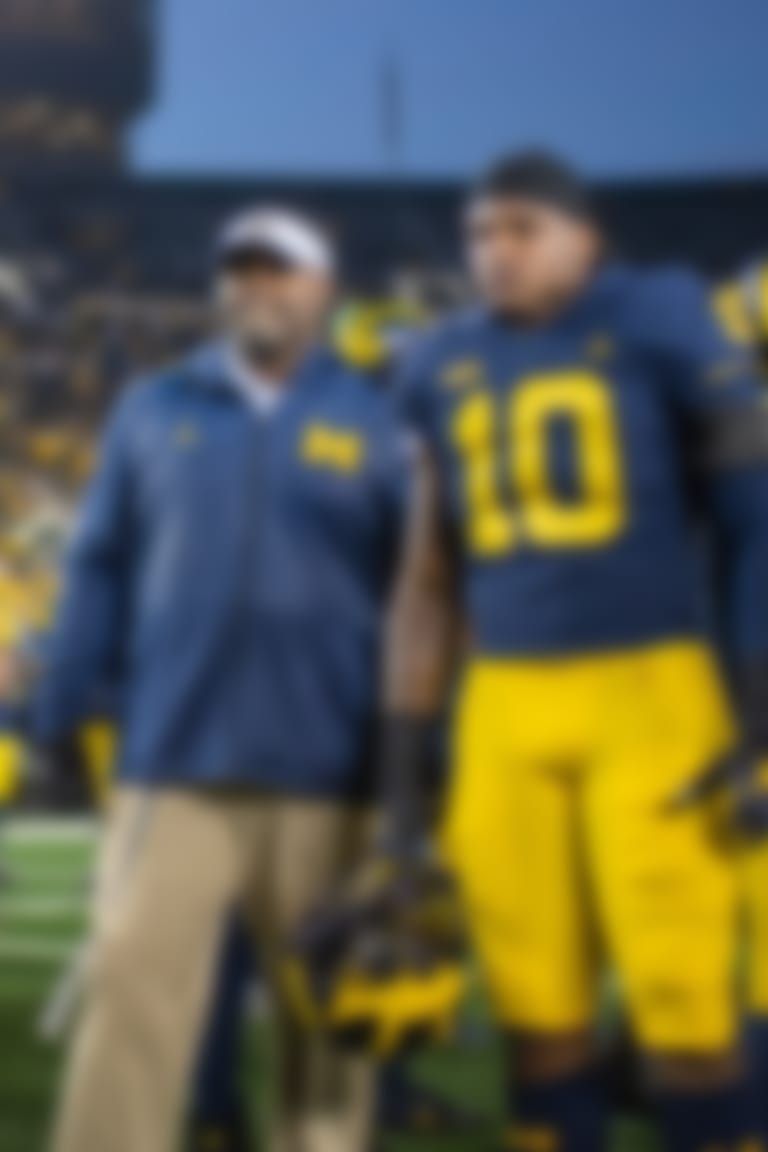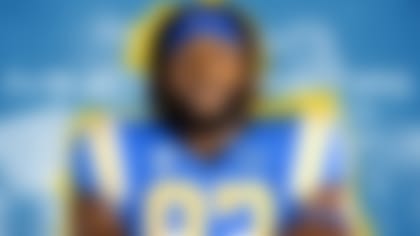Devin Bush Jr. learned difficult lessons from his Super Bowl-winning father and coach, who just might have helped punch his son's ticket to the draft's first round
By Jim Trotter | Published April 3, 2019
PHOENIX -- Devin Bush Jr.'s hunger is reaching a critical stage. It is early March, and for the previous two months he has been living far from home, holed up in a sprawling apartment complex that looks like stacked earth-toned ice cubes. His focus has been singular: preparing for the NFL Scouting Combine and his pro day at the University of Michigan. That has meant five workouts each weekday and two more on Saturdays.
But on this afternoon, the All-America linebacker has made the mistake of fasting, and now his stomach is letting him know. He has a taste for soul food, so he's off on a 30-minute drive to Lo-Lo's Chicken and Waffles, where he requests a made-to-order burger topped with an over-easy egg, a side of smothered chicken and a slice of red velvet cake.
He attacks the meal as if it's an unprotected quarterback. Only one thing slows him down: a question about whether his status as a projected first-round draft choice was preordained because his father, Devin Bush Sr., was a 1995 first-round pick of the Atlanta Falcons who played eight seasons in the league. His eyes roll as he shakes his head, and the exasperation in his voice can be heard over the loud music and elevated chatter in the restaurant.
"If you were in my shoes, you wouldn't say that," he says. "If you were in my shoes, I promise you nine times out of 10 you would have stopped playing football because of everything my dad did. You'd be like, 'F--- that, I'm good, I don't want to play football.' "
Devin and his father are extremely close, sharing a telepathy that allows them to know what the other is thinking without words being spoken. But it wasn't always that way. For much of his childhood, Devin was perplexed by his father. He could not figure out why his dad pushed him so hard on the athletic field, creating an Orwellian environment in which the youngster was told he was wrong even when he was right. On some days it confused Devin, on others it angered him. The situation also scared him enough that for years he could not bring himself to ask his dad the question he desperately wanted answered: Why are you always so hard on me?
Sometimes a father's love can be misinterpreted by a son not old enough to see the big picture. Bush Sr. recognized his son had the athletic ability to be special the first time he watched him on a football field as a 7-year-old trying out for the Pasadena Lakes Panthers youth football team in South Florida. He could see the exceptional vision and balance, though in hindsight neither surprised him. It was common for Devin to be uncommon, like when he went from learning to walk to literally running overnight. Most toddlers might stumble around for a day or two after taking their first steps, but young Devin bypassed the awkward stage.
"He would run everywhere," Bush Sr. said. "You would have to tell him to slow down before he ran into the wall, but he'd run into the wall, hit it hard, bust his head open, get up and laugh, thinking it was funny. Or he might cry for half a second before going back to what he was doing."
Watching his son on the field that afternoon for the first time as a 7-year-old, Bush Sr. could clearly see the talent. He had won a national championship as a safety at Florida State in the early '90s and participated in two Super Bowls as a professional, losing one with the Falcons before winning one with the St. Louis Rams, so game was recognizing game. But instead of enjoying the moment, he found himself worrying that football was coming too easily for his son. Young Devin's instincts were high, his reactions quick. Concerned it could dull his son's competitive edge, Bush Sr. formulated a plan to keep Devin humble and challenged.
"I wanted him to feel like he wasn't good, so I made him play against older guys who were bigger, stronger, faster," he said. "That way the game wouldn't come as easy, or the things he was doing wouldn't come as easy."
But before that, he needed to know if his son wanted to play for the right reasons. Was it because he loved the game or because he was seeking his father's approval? Bush Sr. had told his son on multiple occasions he would be fine if the youngster pursued other interests, but Devin, who was known for keeping things inside, never reacted strongly -- until the day he and his dad returned from that initial tryout.
Bush Sr. was in the kitchen when Devin walked in and asked if he had made the team. The squad was supposed to be announced that night. Dad knew ahead of time his son had made the final cut, but he told Devin the coaches had yet to call. It was a test; he wanted to see how badly it mattered to his son. Later that evening, Devin asked again.
"You didn't make it," his father said.
"I didn't make the team?!" a stunned Devin replied.
"Nah, you weren't good enough."
Devin fell to the floor, kicking and screaming.
"I want to play! I want to play! Please let me play!"
The pleas ensued for five minutes, with Dad staying silent. Kesha Bush turned to her husband and asked why he was punishing their son.
"Just leave it alone," he said. "Let me do what I'm doing."
I WASN'T THERE FOR THEM TO BE FEELING GOOD ALL THE TIME, BECAUSE LIFE DOESN'T MAKE YOU FEEL GOOD ALL THE TIME. I WASN'T GOING TO CHEAT THEM OUT OF REAL LESSONS. DEVIN BUSH SR.
Finally, Bush Sr. had the answer he had been seeking. Devin wanted to play because he wanted to play for himself, not anyone else. His father had handed him a Get Out of Football Free card, but the son refused to take it. Bush Sr. picked him up off the floor, told him to wipe his face, then informed Devin that he had, in fact, made the Panthers' final roster.
It was only an indicator of things to come. As Devin's youth coach, Bush Sr. wanted to teach lessons to his son and the entire team that could be applied to life as well as football. Such as the reality that life can be difficult, and you need to know how to adjust to circumstances. He stressed the importance of being prepared, getting up when knocked down, and finding a light in perceived darkness.
"I really believed in what my message was for the younger guys, and I didn't care how they took it because I knew what I was trying to instill in them -- that one day they would wake up and recognize those lessons and understand what I was trying to teach them was for their benefit and they could pass it on to others," said Bush Sr. "I wasn't worried about how delicate it could get or if it could push them the wrong way at that time, because when you get in intense situations, which tends to happen, and you work your way through them, you come out on the other side better than you were before. I really believed in the game and the lessons it taught. I wasn't there for them to be feeling good all the time, because life doesn't make you feel good all the time. I wasn't going to cheat them out of real lessons."
The goal was to keep his son grounded, hungry and hard-working, which meant treating him as a guy instead of the guy.














